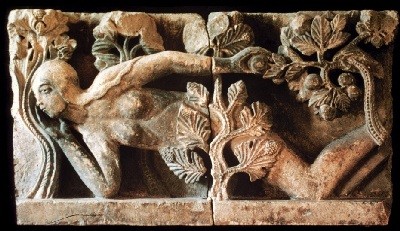Outsider poems, a mini-anthology in progress (44): Gwerful Mechain's 'Ode to the Pubic Hair'

Every foolish drunken poet,
boorish vanity without ceasing,
(never may I warrant it,
I of great noble stock,)
has always declaimed fruitless praise
in song of the girls of the lands
all day long, certain gift,
most incompletely, by God the Father:
praising the hair, gown of fine love,
and every such living girl,
and lower down praising merrily
the brows above the eyes;
praising also, lovely shape,
the smoothness of the soft breasts,
and the beauty's arms, bright drape,
she deserved honour, and the girl's hands.
Then with his finest wizardry
before night he did sing,
he pays homage to God's greatness,
fruitless eulogy with his tongue:
leaving the middle without praise
and the place where children are conceived,
and the warm cunt, clear excellence,
tender and fat, bright fervent broken circle,
where I loved, in perfect health,
the cunt below the smock.
You are a body of boundless strength,
a faultless court of fat's plumage.
I declare, the cunt is fair,
circle of broad-edged lips,
it is a valley longer than a spoon or a hand,
a ditch to hold a penis two hands long;
cunt there by the swelling arse,
song's table with its double in red.
And the bright saints, men of the church,
when they get the chance, perfect gift,
don't fail, highest blessing,
by Beuno, to give it a good feel.
For this reason, thorough rebuke,
all you proud poets,
let songs to the cunt circulate
without fail to gain reward.
Sultan of an ode, it is silk,
little seam, curtain on a fine bright cunt,
flaps in a place of greeting,
the sour grove, it is full of love,
very proud forest, faultless gift,
tender frieze, fur of a fine pair of testicles,
a girl's thick grove, circle of precious greeting,
lovely bush, God save it.
After the translation from Welsh by Dafydd Johnston (slightly modified)
COMMENTARY
with John Bloomberg-Rissman
SOURCE: Dafydd R. Johnston, ed., Canu Maswedd yr Oesoedd Canol, or Medieval Welsh Erotic Poetry, Seren Books, Bridgend CF31 3AE, 1991, 1998)
(1) “Gwerful Mechain of Powys was active about 1480, and she is the only female poet of medieval Wales by whom a substantial corpus of poetry has survived. Her subject matter is varied and the erotic poems are only a small proportion of her work. … This [poem] is a reaction to poems by men, in this case the detailed descriptions of girls’ physical appearance which ignore the most important part of their bodies.” (Dafydd Johnston) But it is in this that the work points forward & back, to lead us to our own time & to the recoveries “out of a woman’s body and experience … as theme and source for art.” (A. Rich) In that sense too the work or vision may go back almost immeasurably before the time of Gwerful herself, but it is the sheer physicality of what she writes that now emerges to inform us & to link with acts of mind & body by poets & artists in our own time who have sought to bring the core facts of their lives (& ours) from a darkness in which the body like the mind was too long hidden. As with others in these pages the time & place for reading her is here & now.
(2) Writes Carolee Schneemann of her 1975 masterwork Interior Scroll, in which she performs nude while reading from a long paper text drawn serpent-like from her vagina: “I thought of the vagina in many ways— physically, conceptually: as a sculptural form, an architectural referent, the sources of sacred knowledge, ecstasy, birth passage, transformation. I saw the vagina as a translucent chamber of which the serpent was an outward model: enlivened by it’s passage from the visible to the invisible, a spiraled coil ringed with the shape of desire and generative mysteries, attributes of both female and male sexual power. This source of interior knowledge would be symbolized as the primary index unifying spirit and flesh in Goddess worship.”
(3) Denise Levertov: “Hypocrite Women”
Hypocrite women, how seldom we speak
of our own doubts, while dubiously
we mother man in his doubt!
And if at Mill Valley perched in the trees
the sweet rain drifting through western air
a white sweating bull of a poet told us
our cunts are ugly—why didn't we
admit we have thought so too? (And
what shame? They are not for the eye!)
No, they are dark and wrinkled and hairy,
caves of the Moon ... And when a
dark humming fills us, a
coldness towards life,
we are too much women to
own to such unwomanliness.
Whorishly with the psychopomp
we play and plead—and say
nothing of this later. And our dreams,
with what frivolity we have pared them
like toenails, clipped them like ends of
split hair.
[From Levertov: Poems, 1960-67. New Directions, 1967]
Poems and poetics